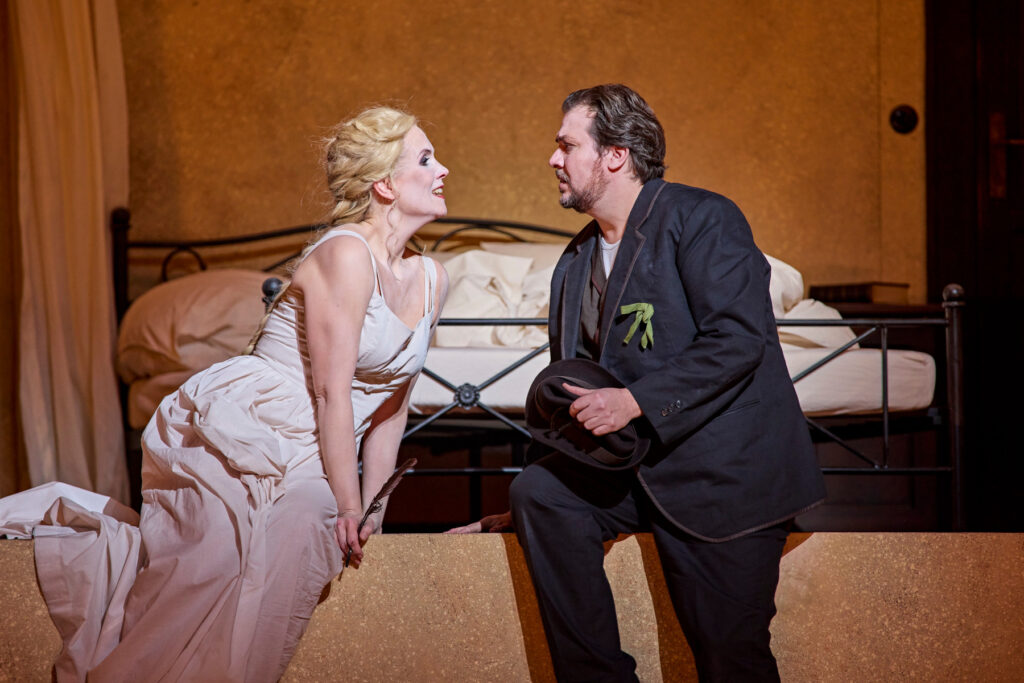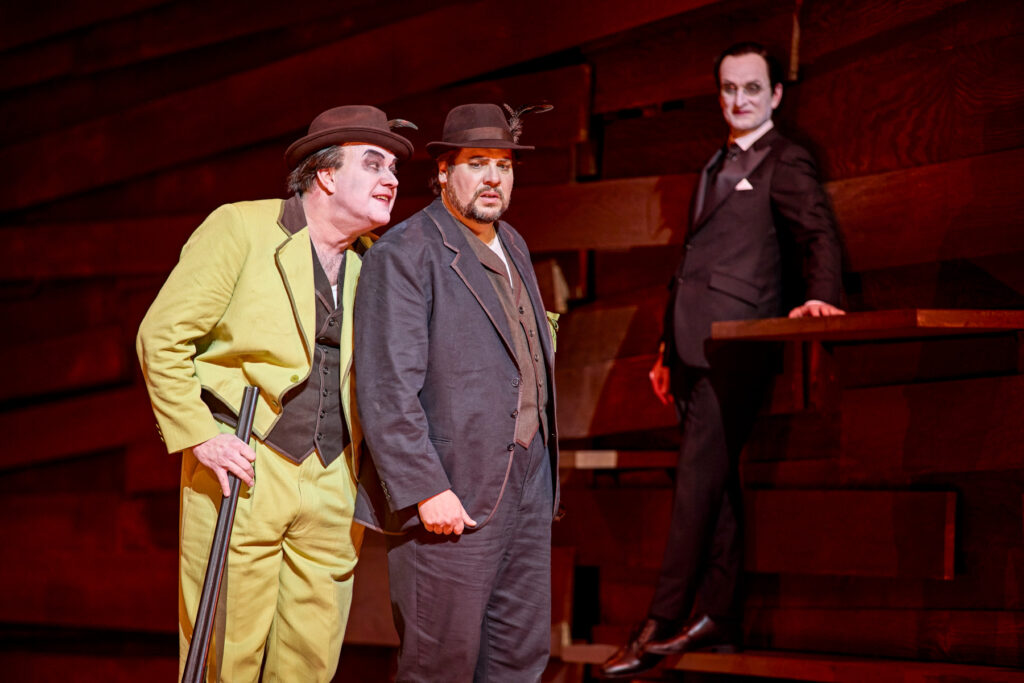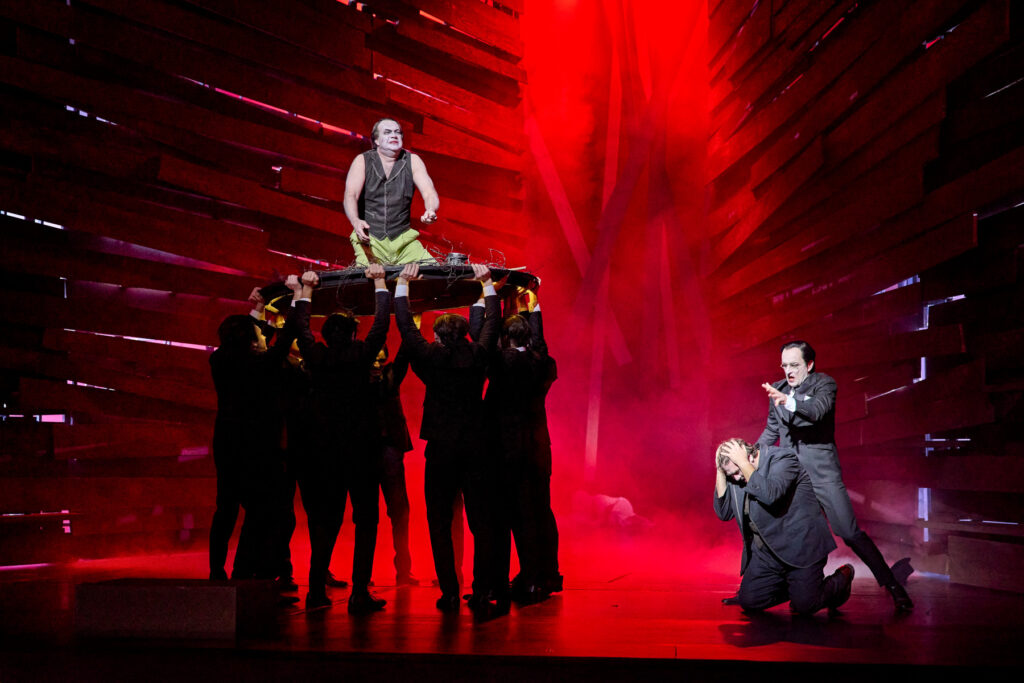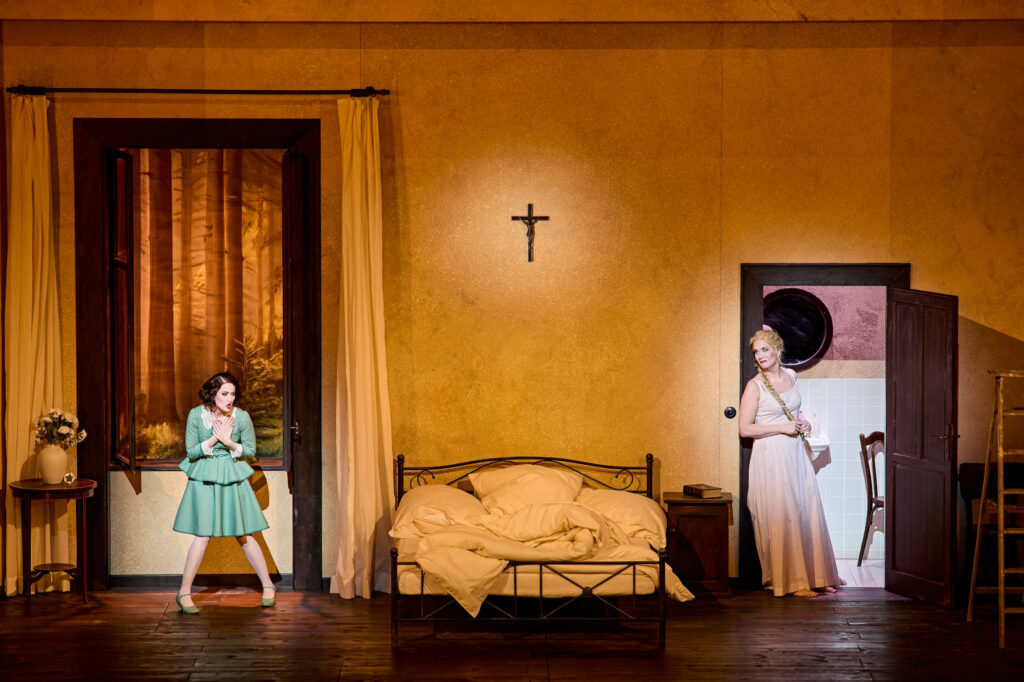It’s not an uncommon experience for people to wake up in the middle of the night, believing they have heard unsettling noises, or feeling those early palpitations of concern about a difficult day of work ahead. Nightmares may or may not have preceded that interruption of slumber: welcome to the world of existentialism. We are all the sum total of our worries and anxieties, the pressures we face in our professional and personal lives, and the mental health issues we battle daily.
Fears about existence itself are what Andreas Kriegenburg taps into in his new production for Hamburg State Opera of Weber’s Der Freischütz. It’s quite a dramatic shift in focus from the traditional fairy-tale with its hunting scenario and supernatural incursions, yet the lonely individual that is at the heart of Søren Kierkegaard’s philosophical ideas is a feature of German Romanticism too. However, not acknowledging the big German forest in this opera would be like watching Wagner’s The Ring cycle without evidence of the River Rhine. Inevitably, delving deep into the German psyche uncovers a long-standing fascination with the forest as a repository of deep-seated fears and desires. Kriegenburg and his set designer Harald B. Thor deal with the necessary sylvan presence by presenting an abstract space boarded up on three sides with wooden planks.

The two leading characters of Max and his betrothed Agathe easily fit into this pattern of existential concerns. Of late Max has been missing more of his targets, which at a symbolic level points to potency problems, so the prospect of magic bullets, like those little blue pills that some men reach for in their hour of need, is very tempting. That in turn is linked to the moral dilemma of having to make an alliance with the devil. Agathe too is like any other virginal bride, worried about what the future may hold in store for her, coupled with an additional warning from the Hermit of the impending intervention of fate.
Highlighting all such fears makes good sense. There is a claustrophobic feel to the enclosed spaces, and Max’s isolation is made palpable from the start in an early beer-hall scene, replete with steins of hop-infused brew carried around the benches, when he sits apart from the company, ears and face covered, and finally buried in folded arms. He then has to endure a mock crucifixion carried out by peasants and foresters, his body tied to a pole and thick board. Agathe in her bridal scene cavatina retreats behind white drapes, shutting out the rest of the world. Elsewhere her loneliness and nervous apprehension edge her towards breakdown.

I am less convinced that the overall staging of this work is altogether coherent or that the hotchpotch of period costumes brings much unity. Kriegenburg’s intention is to create a timeless quality by dispensing with a specific reference, choosing elements drawn from the Biedermeier epoch between 1815 and 1848 as well as the 1920s and 1950s. That produces much head-scratching: Agathe has a period bedroom of sorts but an adjacent ensuite with a very modern looking basin. The bridesmaids in their costumes could just as easily have come from the kitchens and scullery of Upstairs, Downstairs.
On the other hand, anybody worth their salt knows how to draw maximum theatrical energy from something like the Wolf’s Glen scene. In addition to the ghoulish effects from the orchestra, Kriegenburg has his voices of invisible spirits advance like mafia gangsters, their oral cavities lit with mini torches that flicker in and out of life. Pallbearers arrive with the corpses of both Max’s mother and Agathe while the entire stage is bathed in crimson-red light. Further electricity is generated during the fashioning of the magic bullets in a special cauldron.

Vocally, the standard is variable. The opera’s only real baddy is Samiel, a representation of Satanic power, kitted out in a three-piece black suit and made to look like something out of Christopher Isherwood, with a mincing gait and a sneering, wheedling tone from Clemens Sienknecht designed to chill the marrow. Maximilian Schmitt as Max and Julia Kleiter as Agathe project little in the way of youthful freshness. The role of Max does not lie entirely comfortably for Schmitt’s voice: though warm, it has fewer problems in the baritone reaches than the frequent stretches into the tenor register. There is a spread in Kleiter’s voice, a metallic edge and lack of allure which I found far from appealing, though she moves cleanly and securely through all the registers. Schmitt struggles somewhat in his interaction with Johan Reuter’s Caspar, who is already in league with the devil and whose strong, rounded, inky bass allied to a commanding presence leave no doubt about his force of character. For Alina Wunderlin’s Ännchen I have nothing but praise. It’s essentially a soubrette role, with obvious links to Despina and Zerlina, with scope for many comic touches, such as the way she clutches a crucifix on the wall at any mention of the supernatural. Wunderlin sings the part with lyrical intensity, relishing the coloratura elements and moving effortlessly in characterisation from teasing her cousin Agathe to consoling her in moments of stress.
In the pit was Yoel Gamzou. At times it sounded as though he too was being pursued by demonic spirits, so brisk and indeed breathless some of his tempi were. I much enjoyed the attention he gave to the dark colouring and weight in the lower strings as well as his respect for Weber’s quite innovative orchestration. There were the deep sighs of the cello, the liquorice-toned obbligato of the viola to accompany Ännchen’s Act 3 Romance, the rich juiciness of the clarinets in their lowest register, and the wailing bassoon to signal Max’s inner turmoil after being banished by Prince Ottokar. Yet the tendency to lurch suddenly from a basic tempo in order to add further dramatic intensity together with a fast and furious galop to both the end of the overture and conclusion to the opera were instances of over-egging the pudding. Weber knew what he was doing.

The choral forces were something of a disappointment. Four bridesmaids are given roles in the score; here we had fifteen but their ensemble singing lacked precision, as did their male counterparts for the Huntsmen’s Chorus, one of the glorious set-pieces of this opera.
Fairy-tales traditionally have happy endings. Good must be seen to triumph and the virtuous need to be rewarded. Since Max’s brutal banishment cannot be allowed to stand, there has to be a deus ex machina intervention by the Hermit who orders a one-year probationary order instead and no more shooting competitions to determine marriage alliances. But at the very end this is still a fairy-tale world; the real world with its plethora of problems remains to plague us all still further. And the moral of the story (for all fairy-tales have one) is: don’t go dancing with the devil.
Alexander Hall
Der Freischütz
Opera in three acts with spoken dialogue based on a story by Johann August Apel and Friedrich Laun, with a libretto by Johann Friedrich Kind
Music by Carl Maria von Weber
Sung in German and with English surtitles
Cast and production staff:
Ottokar – Andrzej Dobber; Cuno – Hubert Kowalczyk; Agathe – Julia Kleiter; Ännchen – Alina Wunderlin; Caspar – Johan Reuter; Max – Maximilian Schmitt; Samiel – Clemens Sienknecht; Hermit – Han Kim; Kilian – William Desbiens
Director – Andreas Kriegenburg; Designer – Harald B. Thor; Costumes – Andrea Schraad; Lighting – Andreas Grüter; Dramaturgy – Angela Beuerle; Choreography – Volker Michl; Chorus Master – Christian Günther; Chorus and Orchestra of Hamburg State Opera; Yoel Gamzou – conductor
Staatsoper Hamburg, 17 November 2024
Top image: The cast of Hamburg’s Der Freischütz
All photos © Brinkhoff/Mögenburg
Further performances until 5 December